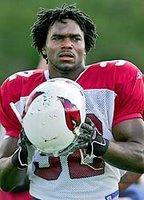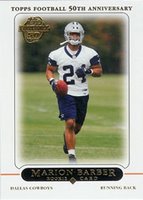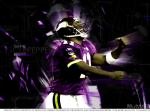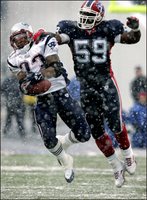Like most things that can be done for free on the internet, fantasy leagues, especially football, have seen a massive boom in popularity in the last five years or so. It’s gotten to the point where I’m a little bit hesitant to trust a male between 20 and 35 who doesn’t play fantasy sports, much like any guy under 30 who doesn’t play video games at all.
For the most part, this has helped to create a better, more educated fan. In the past, people really only followed the elite teams in the league, as well as their home team and division rivals, however, now each fan pays at least some attention to every team in the league. For example, right now if I had to write down the starting and backup Quarterback and halfback, top three receivers, and starting tight end for every team in the NFL, I’d probably get at least 85% of them right, and I doubt anyone in my league would do worse than 60%. This knowledge isn’t at all useful in any other area of life, and honestly it’s not even really that helpful in a fantasy league, but you just kind of absorb it. In addition, we now care about any development that might have the slightest impact on any individual player’s performance. However, I think that sometimes, we may be looking a little too closely and allowing our fantasy interests to influence our perceptions of the actual game. Some of these misconceptions are already starting to influence the actions of GMs and coaches in addition to fans. So, I’ve decided to take it upon myself to point out the five major misconceptions I’ve noticed, before things get too out of hand.
Misconception #1 - Yardage Makes the Team: This actually goes back to before fantasy football and has to do with the way that teams are ranked offensively and defensively, although FFL has definitely made things worse. Apparently at some point it was decided that total yardage should be used to rank offenses and defenses in the NFL, which is kind of like ranking baseball teams by the number of hits they get/allow, or NBA teams by the number of shot attempts. What was wrong with just ranking them by how many points they score/allow? I understand that people are trying to evaluate the offensive and defensive “units” of a team, but isn’t the best offensive team the one that can score the most points, even if they do it because they score with their special teams and defense and usually have good field position? The problem is that you can’t really separate a team’s offensive and defensive success in football any more than you can in basketball or soccer. Even though different players involved, each unit feeds off of (or is held back by) the other.
Misconception # 2 – A Great Offense Starts With a Great Running Back: While Mark may wish to dispute this, fantasy football teams are largely built around the running back position. What a lot of people forget is that the running back is the third or fourth most important player on most running plays (behind the blockers immediately involved), and is really only important on passing plays when the defense sends the house or the offensive line screws up. Because of this, on a real football team, the running back is like one of the regular employees at Target or Best Buy - it helps to have someone consistently great, and it hurts to have someone woefully incompetent, but very few people are good or bad enough to make a noticeable difference – right now in the NFL, Tomlinson is an all-time great, Alexander and LJ are good enough to make a difference, and that’s really about it. Just imagine, if there was a massive trade this summer where Fred Taylor, Cadillac Williams, Dominic Rhodes, the Jones Triplets, Reuben Droughns, Deuce McAllister, Willie Parker, Travis Henry, Willis McGahee, Tatum Bell, Chester Taylor, Rudi Johnson, Ronnie Brown, Frank Gore, Jamal Lewis, and Edgerrin James all changed teams…would anyone really get noticeably better or worse? Am I nuts for thinking that all of those guys are pretty much interchangeable? If anything, the teams getting the less established guys would benefit because of the cap space. By the way, that was more than half of the starting running backs in the NFL.
if there was a massive trade this summer where Fred Taylor, Cadillac Williams, Dominic Rhodes, the Jones Triplets, Reuben Droughns, Deuce McAllister, Willie Parker, Travis Henry, Willis McGahee, Tatum Bell, Chester Taylor, Rudi Johnson, Ronnie Brown, Frank Gore, Jamal Lewis, and Edgerrin James all changed teams…would anyone really get noticeably better or worse? Am I nuts for thinking that all of those guys are pretty much interchangeable? If anything, the teams getting the less established guys would benefit because of the cap space. By the way, that was more than half of the starting running backs in the NFL.
Misconception #3 – Running Back Committees are Killing the NFL: Let’s face the facts – Marion Barber III has 11 rushing TDs this year, third in the NFL. Brandon Jacobs has 8. Maurice Jones-Drew and Joseph Addai have 7. Cedric Benson and Mike Bell have 5. All six of those guys, by the way, have more touchdowns than the “starting” running backs on  their respective teams, and Jacobs is the only one in the group that would be considered a goal-line back. Within the last few years, the Chiefs, Bears, Saints, and Patriots have all used first-round picks on running backs when they already had accomplished starters they weren’t planning to get rid of, which would have once been considered insanity. The running back by committee era has started, and it’s probably going to get worse before it gets better. I wouldn’t even be shocked if, within ten years, running backs are on a “touch count,” like starting pitchers, and coaches won’t let them get the ball more than 20-25 times a game.
their respective teams, and Jacobs is the only one in the group that would be considered a goal-line back. Within the last few years, the Chiefs, Bears, Saints, and Patriots have all used first-round picks on running backs when they already had accomplished starters they weren’t planning to get rid of, which would have once been considered insanity. The running back by committee era has started, and it’s probably going to get worse before it gets better. I wouldn’t even be shocked if, within ten years, running backs are on a “touch count,” like starting pitchers, and coaches won’t let them get the ball more than 20-25 times a game.
This has two obvious effects on fantasy football – one is that the “stud” running back is an endangered species, much like the manatee. In most years there have been 5 or 10 backs that could be counted on for 15-30 points every week, now there’s really just Tomlinson and Johnson (the Alexander and Portis injuries haven’t helped either). The other effect is that there are now 40-50 running backs who can be expected to at least get a few touches in every game, so you rarely have people being forced into starting Troy Hambrick or Zack Crockett, and both of these developments make fantasy football a lot less fun. But are they really bad for the NFL? Running backs should stay healthier and have longer careers, offenses have more different looks available, there’s more potential for locker room dissension and infighting, and there are that many more crazy personalities to follow…I don’t see any downside here. I don’t think people would even hate Shannahan if not for fantasy football, although I think he does this to the point that it’s detrimental to his team (especially if he’s going to do this with the quarterback, too).
Misconception #4 – Turnovers Don’t Matter: I don’t think that any football fans actually think this, at least not when watching a game they have a rooting interest in, but I do think that very few leagues penalize turnovers nearly enough, and that this has started to affect the way that people evaluate certain players and teams. I’m basing this off of two  things – one, that everyone thought the Bengals were struggling early this season because Palmer wasn’t throwing for enough TDs and yards, when the real problem was that he was fumbling too much (which has improved along with the other #s - and no, I probably wouldn't have noticed this if he wasn't on my fantasy team), and two, that multiple people considered Daunte Culpepper to be one of the best QBs in the league in his prime, despite the fact that he was a mortal lock to average at least 1.5 turnovers per game.
things – one, that everyone thought the Bengals were struggling early this season because Palmer wasn’t throwing for enough TDs and yards, when the real problem was that he was fumbling too much (which has improved along with the other #s - and no, I probably wouldn't have noticed this if he wasn't on my fantasy team), and two, that multiple people considered Daunte Culpepper to be one of the best QBs in the league in his prime, despite the fact that he was a mortal lock to average at least 1.5 turnovers per game.
Misconception #5 – Numbers Don’t Lie: You’d probably think I was crazy if I said that London Fletcher was the best defensive player in the league right now, wouldn’t you? Or that DeMeco Ryans and Kerry Rhodes were better than Brian Urlacher? Of course you would, even though both of those things are true in our fantasy league. Because you’re still used to evaluating defensive players by, of all things, watching football games that they play in. Unfortunately, average fans  now have to be able to evaluate every offensive player, not just the Pro Bowlers and the ones on their favorite team. And since few people have the time or desire to watch every game in the league (and even if you do, a lot of the games happen at the same time), we now evaluate offensive players based almost exclusively on their statistics.
now have to be able to evaluate every offensive player, not just the Pro Bowlers and the ones on their favorite team. And since few people have the time or desire to watch every game in the league (and even if you do, a lot of the games happen at the same time), we now evaluate offensive players based almost exclusively on their statistics.
The problem is, statistics aren’t perfect. If Tony Romo bounces a pass off of a defensive back’s hands, and TO scores a touchdown, it looks exactly the same on your fantasy league page as it would if it was a perfect strike. If TO drops a pass, it looks the same as if Romo missed him by five yards (I’m using these two as examples since I’m watching the Cowboys-Saints game right now, and because neither of those players get nearly enough attention. As far as the game goes, let’s just say that the Saints are starting to scare me a little bit as a Bears fan, and the Cowboys scare me even less than they did before this week). The second-best receiver often outperforms the primary receiver on a team because of the way defenses cover them (Owens and Terry Glenn, TJ Houshmanzadeh and 85 in the first half of this season, Torry Holt and Isaac Bruce a few years ago, Marvin Harrison and Reggie Wayne – an up-and-coming Holt/Bruce situation btw, Marques Colston and Joe Horn, etc.). The #2 running back on a team always gets more yards per carry than the starter, even though they’re rarely actually better.
Or, for a historical example, look at Gayle Sayers – in his best season (1966), he had over 1600 combo yards and 10 TDs, which would make him a borderline fantasy stud. If you take his second-best season (1969), he would have had fewer fantasy points (in our league) through 14 games than, among others, Chester Taylor, Kevin Jones, Joseph Addai, Rudi Johnson, Marion Barber, Thomas Jones, and Reggie Bush. He’d be a #2 running back at best. Or, for a more recent example, look at John Elway’s 1998 season. You’d think that you’d take the 1998 John Elway over anyone in the league but Manning and maybe Palmer or Brady (who is an average fantasy quarterback). Not if you were starting a fantasy team. If you were doing that, you’d rather have Jon Kitna.
There are some things that could help a little with this. I think it’d be a good idea to penalize turnovers that lead to points more harshly, or give quarterbacks and defenses ten points for a win, or give points for getting first downs, but fantasy scoring is already too complicated for a lot of people. So all I’m asking is that you vt readers not be part of the problem. Just watch as many real games as fantasy ones for the rest of the season, and form your opinions based on the former.
Sunday, December 10, 2006
Losing Touch With Reality
Posted by
Ek
at
12/10/2006 10:59:00 PM
![]()
Labels: Ek, Fantasy Sports, NFL
Subscribe to:
Post Comments (Atom)

4 comments:
Did you mean to leave Steven Jackson off that list of interchangeable running backs? Because if so, good choice. I think he may be in the upper echelon with those other three, which might be the place you can put Reggie Bush, too.
Yeah - Jackson and Portis (there might be one or two others I'm forgetting) were left off the "interchangeable" list, but not quite put on the "definitely good enough to make a difference" list. It was intentionaly in both cases.
Ek, while I agree with the premise that most RB's aren't nearly as vital to the success of an offense as most people think, or as a good o-line/fullback and/or QB, I must make one point...
Not all RB's could be interchanged on a wide variety of teams. This, however, is not really a function of the quality of the players in question, as much as it is a function of style. For instance, Brian Westbrook is a highly affective RB in philly's offense, much like Stephen Davis once was in Carolina's. WIthout a power/punishing back Carolina's running game has struggled mightily (obviously O-line injuries have something to do with this too). In the same way, Philly's offense would struggle greatly as a whole (not really in rushing yards, but overall offense) without Westbrook. He is replaceable, but only by a similarly talented RB with a similar skill set.
Oh, and I promise I'll have a VT article up at some point in the near future, hopefully before New Years (or just after)!
Good point. Although there are only really three types of running backs in the interchangeable group - "north-south" or "power" runner (Anthony Thomas, Ced Benson, Reuben Droughns), the "scat-back" who relies on speed and agility and is usually a viable weapon in the passing game (like Westbrook, Warrick Dunn, or Thomas Jones), and the balanced back who can do both, but isn't really great at either (Caddy Williams, Travis Henry, Kevin Jones). I think as long as you aren't swapping a scat-back for a power guy or vice versa, the team is going to look about the same. So I could ammend that one.
The main point I was getting at (and I didn't state it very well) is that the offensive line consists of five of the six most important players on an offense (along with the QB), and most people understand that on some level but seem to forget it often.
Merry Christmas everyone.
Post a Comment